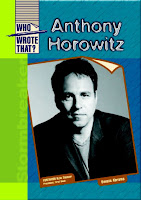 Gillian Shields' Immortal reminds me of things I've read--I've just can't think what. It starts out with a marvelous description of the boarding school to which Evie is sent when her grandmother becomes ill, and the tone is set for a creepy, Gothic tale of eternal infatuation. Evie is not welcome at the exclusive school, but this doesn't completely dampen her sassy spirit (which is a great contrast to all the gloom), especially when a chance meeting with a handsome young man brightens her world. Nothing is what it seems, however, and there is evil brewing at Wyldcliffe Abbey. Told in alternating chapters of Evie's experiences and a young lady's journal from 1882, this won't see a huge readership, but will hit the spot for certain girls who like Eve Bunting's The Presence, and has such a cool cover that I can probably offer it to Twilight fans.
Gillian Shields' Immortal reminds me of things I've read--I've just can't think what. It starts out with a marvelous description of the boarding school to which Evie is sent when her grandmother becomes ill, and the tone is set for a creepy, Gothic tale of eternal infatuation. Evie is not welcome at the exclusive school, but this doesn't completely dampen her sassy spirit (which is a great contrast to all the gloom), especially when a chance meeting with a handsome young man brightens her world. Nothing is what it seems, however, and there is evil brewing at Wyldcliffe Abbey. Told in alternating chapters of Evie's experiences and a young lady's journal from 1882, this won't see a huge readership, but will hit the spot for certain girls who like Eve Bunting's The Presence, and has such a cool cover that I can probably offer it to Twilight fans. Warning: It sounds like I didn't like Fire, but I DID. It just confused me a bit, and made me sad for the main character, and I want to go back to the Dells and make sure that Fire is going to be okay, but I can't, because I don't know when Bitterblue is coming out.
Warning: It sounds like I didn't like Fire, but I DID. It just confused me a bit, and made me sad for the main character, and I want to go back to the Dells and make sure that Fire is going to be okay, but I can't, because I don't know when Bitterblue is coming out.Had to wait a while for the sequel to Graceling, and it took me three days to get through this! It's set in the same world as the first book, but concerns Fire, a young lady whose father was a human monster and who can control the minds of people around her. She is beautifully attractive to men and to monster-monsters, who are attracted by her blood. Her world is a bleak, bleak place. She is constantly fighting for survival, battling her own feelings about being a monster, and getting involved in other people's battles to save kingdoms.
This was a bit hard to follow. Still not quite sure what went on as far as the plot is concerned. I'm a little foggy about the whole monster thing-- why is her hair so different that she always needs to have it covered? Do we really need to hear so many times that the scent of her blood attracts monsters? Are there any characters in the book who aren't having problems? Perhaps the difference was that I didn't like Fire as much as I liked Katsa, and this book was so overwhelmingly sad. And kind of obsessed with babies, which made a little more sense after I just visited Kristin Cashore's blog.
If you have Graceling, you must buy Fire, but reading this also reminded me that for some reason, I don't have the huge group of fantasy lovers that I had last year. You know, the kind who read a book a day and will ONLY read fantasy. *Sigh* Must go do something happy now, like plan out future library work space with tape and paper.












































 My 6th grader is reading A Long Way From Chicago and complaining about Grandma Dowdel, and unfortunately this colored my enjoyment of Peck's latest in this series, A Season of Gifts. By 1958, Grandma has moved to town but continues her down home ways. She is observed, in this installment, by Bob, the son of the new minister, his younger sister Ruth Ann, and his older sister Phyllis (who is secretly dating the town punk). The situations in this book seemed strained to me, and the message belabored. Peck's a great writer, but perhaps the awards have made him out of touch with students. The Teacher's Funeral hasn't been checked out in two years, but my copies of Ghosts I Have Been and Princess Ashley are in tatters. A lot of copies of this will be bought, but I'm just not sure how many will be read by children.
My 6th grader is reading A Long Way From Chicago and complaining about Grandma Dowdel, and unfortunately this colored my enjoyment of Peck's latest in this series, A Season of Gifts. By 1958, Grandma has moved to town but continues her down home ways. She is observed, in this installment, by Bob, the son of the new minister, his younger sister Ruth Ann, and his older sister Phyllis (who is secretly dating the town punk). The situations in this book seemed strained to me, and the message belabored. Peck's a great writer, but perhaps the awards have made him out of touch with students. The Teacher's Funeral hasn't been checked out in two years, but my copies of Ghosts I Have Been and Princess Ashley are in tatters. A lot of copies of this will be bought, but I'm just not sure how many will be read by children.



 Read
Read 
